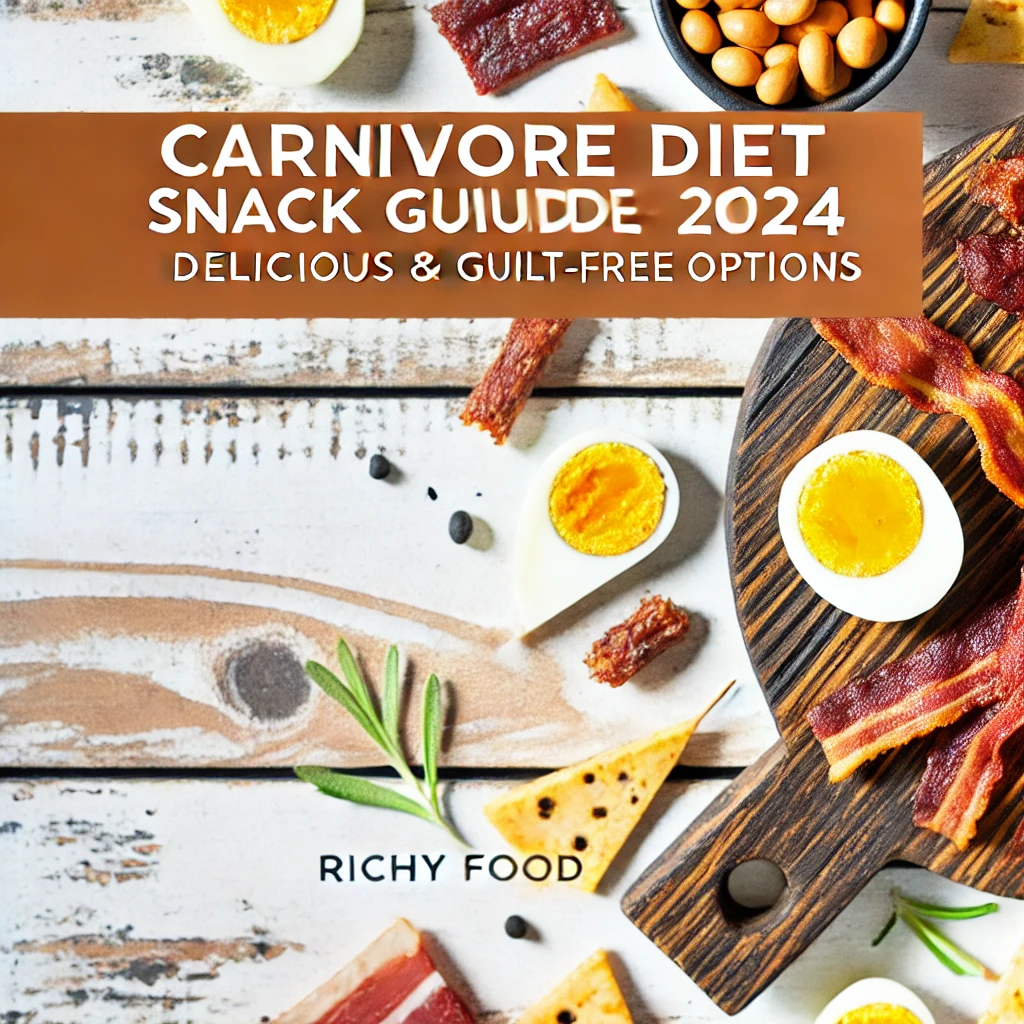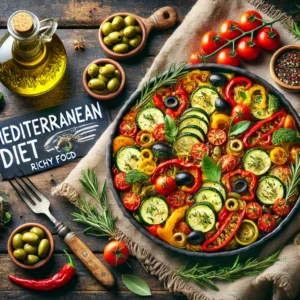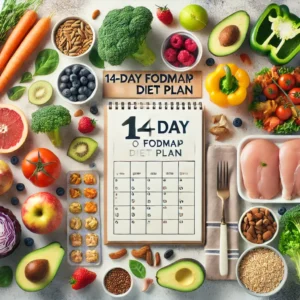Table of Contents
1. What is the Carnivore Diet
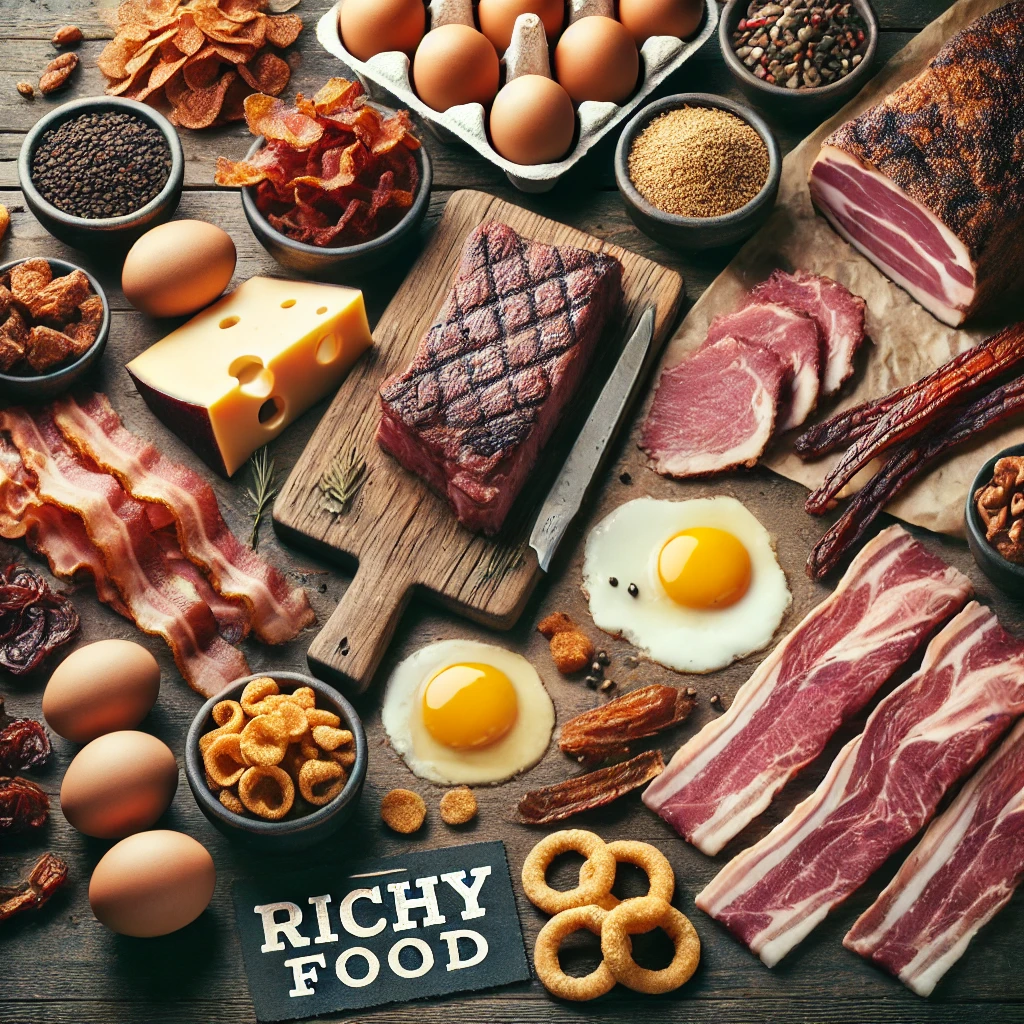
The carnivore diet is a unique, animal-based eating plan that restricts all plant foods, focusing entirely on meat, fish, eggs, and certain animal-derived products. Followers of the carnivore diet eat exclusively from animal sources, aiming to eliminate plant-based ingredients like fruits, vegetables, grains, legumes, nuts, and seeds. This diet has gained popularity for its simple approach and reported benefits, such as increased energy, mental clarity, and weight management. However, it is highly restrictive and not without its challenges, especially when it comes to finding variety in food options—especially snacks.
The Basics of the Carnivore Diet
| Allowed Foods | Restricted Foods |
|---|---|
| Meat (beef, pork, lamb) | All plant-based foods |
| Poultry (chicken, turkey) | Fruits and vegetables |
| Fish and seafood | Grains and legumes |
| Eggs | Nuts and seeds |
| Animal fats (butter, ghee) | Processed foods and sugars |
| Limited dairy (cheese) | Plant oils (olive, avocado) |
On this diet, meat-based foods become the primary source of proteins, fats, and essential nutrients. The goal is to focus on nutrient-dense, unprocessed foods from animal sources, which are believed to reduce inflammation, support metabolic health, and improve overall well-being.
Potential Benefits of the Carnivore Diet
- Simplified Food Choices: The carnivore diet eliminates most food groups, making meal planning straightforward and focusing on high-quality protein sources.
- May Reduce Inflammation: Some people report reduced inflammation and fewer autoimmune symptoms due to the absence of plant-based foods, which can contain anti-nutrients like lectins and phytates.
- Increased Satiety: High-protein, high-fat meals often help control hunger and cravings, which can make it easier to avoid overeating or frequent snacking.
While the carnivore diet offers potential health benefits, it also presents unique challenges, especially when it comes to finding snacks. Since traditional snacks often involve plant-based ingredients, navigating carnivore-friendly snacks requires creativity and planning.
2.Why Snacks Matter on the Carnivore Diet
For those following the carnivore diet, snacks play an essential role in maintaining energy, managing cravings, and supporting dietary goals. While the carnivore diet is inherently satiating due to its high protein and fat content, finding suitable snack options is crucial for those who lead busy lives or need convenient food options on the go. Here’s why snacks are particularly valuable for carnivore dieters and how they can help enhance the overall diet experience.
Boosting Energy Between Meals
- High-Quality Protein: Carnivore-friendly snacks, rich in protein, provide a sustained energy boost without blood sugar spikes, unlike carbohydrate-heavy snacks.
- Essential Fats: Incorporating high-fat snacks like pork rinds, cheese, and butter packs helps maintain energy levels, especially during long periods between meals. “Snacking on high-quality animal fats and proteins is beneficial on the carnivore diet, as it fuels the body steadily, without the crashes associated with carbs.”
Curbing Cravings and Staying Satiated
- Managing Hunger: Protein and fat are known to be highly satiating, helping carnivore dieters manage hunger and prevent overeating.
- Craving Control: For many, a mid-day snack like beef jerky or cheese crisps can prevent cravings for non-carnivore foods, which helps maintain diet adherence.
Ensuring Nutrient Balance
- Nutrient-Dense Snacks: Snacks like liver jerky or bone broth offer a convenient source of essential micronutrients, particularly iron, B vitamins, and collagen, which support skin, joint, and digestive health.
- Vitamin and Mineral Support: Regular snacking on nutrient-rich animal products can help fill any nutritional gaps, as some carnivore dieters may find themselves lacking certain vitamins or minerals due to dietary restrictions.
Convenience for Busy Lifestyles
- Portable and Shelf-Stable Options: The best carnivore diet snacks are easy to carry, non-perishable, and quick to eat, making them ideal for those with hectic schedules or frequent travel.
- Homemade and Store-Bought Choices: With the variety of shelf-stable options like pork rinds, dried sausages, and cheese sticks, carnivores can stock up on convenient snacks that align with their diet goals.
Quick Recap: Why Snacks are Important
| Benefits of Carnivore Snacks | Examples |
|---|---|
| Boosts energy and sustains fuel | Pork rinds, bacon strips |
| Curbs cravings and controls hunger | Beef jerky, cheese crisps |
| Provides essential nutrients | Liver jerky, bone broth |
| Convenient for on-the-go lifestyles | Canned fish, dried sausages |
Carnivore snacks not only add variety and convenience but also help dieters stay aligned with their goals. With the right snack choices, carnivore followers can enjoy a balanced, nutrient-dense diet that keeps them energized and satisfied.
3.What Makes a Good Carnivore Diet Snack
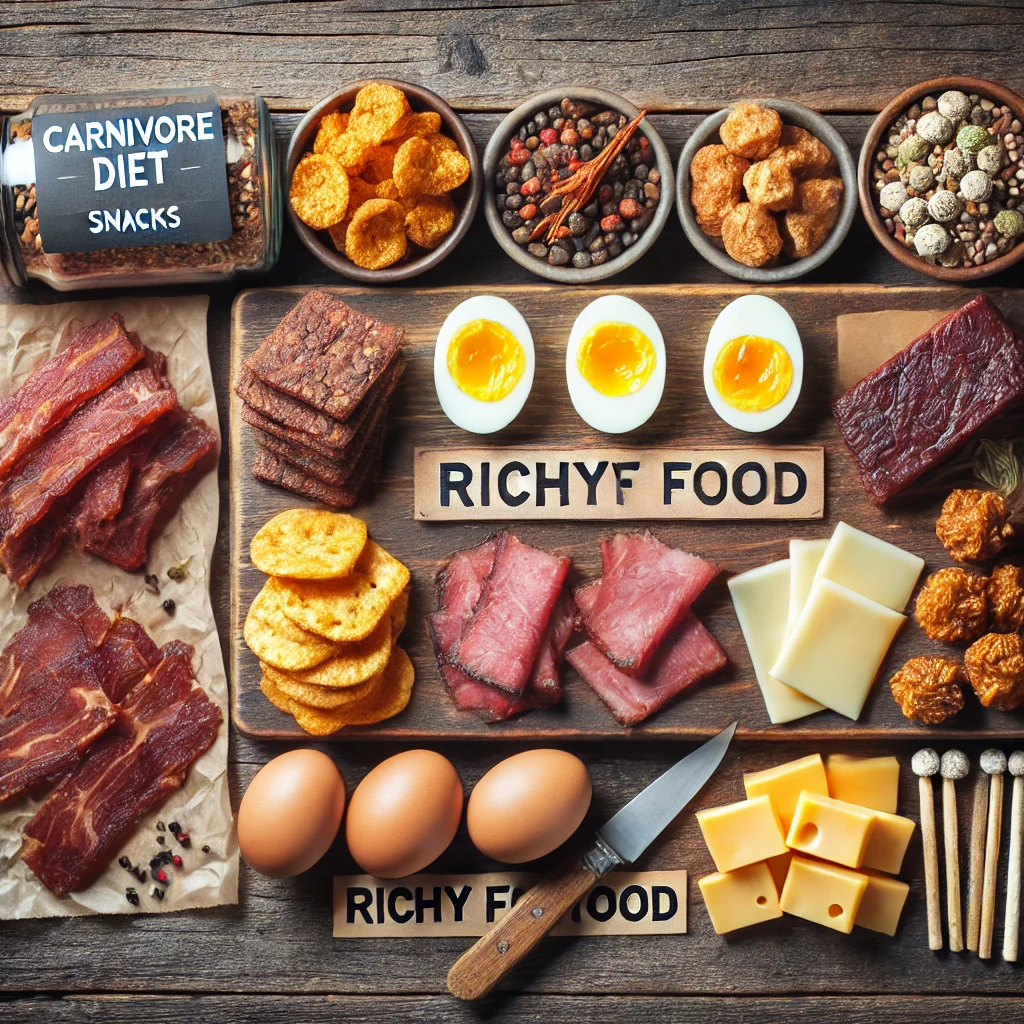
Finding the perfect snack on the carnivore diet can be a challenge, as traditional snacks often contain plant-based ingredients that are off-limits. However, a few essential criteria can help you select snacks that are satisfying, portable, and nutritionally aligned with the diet. Here’s what makes a snack truly carnivore-friendly.
Animal-Based Ingredients Only
- Primary Ingredients: A good carnivore diet snack should be composed entirely of animal-based ingredients, such as meat, fish, eggs, or dairy. This ensures the snack stays within the diet’s guidelines and provides the high-quality proteins and fats that the carnivore diet emphasizes.
- Avoiding Additives: Look for snacks without artificial additives, preservatives, or fillers. Clean ingredient lists with only animal-based sources are ideal.
High in Protein and Fat for Satiety
- Protein Content: Protein-rich snacks, like jerky and hard-boiled eggs, help keep you full and curb hunger between meals. Protein is a key nutrient in the carnivore diet, as it promotes muscle maintenance and supports metabolic health.
- Healthy Fats: Snacks like pork rinds, cheese, and even butter packs provide the fats that help sustain energy levels. Fats are essential for a carnivore diet, offering calories, flavor, and a sense of fullness without causing blood sugar spikes.
Nutrient-Dense and Satiating
- Essential Nutrients: Snacks that provide vitamins and minerals, like liver jerky or bone broth, can help carnivore dieters meet their micronutrient needs. Liver, for instance, is rich in B vitamins and iron, while bone broth provides collagen, supporting joint and skin health.
- Dense Caloric Value: Since carnivore diet snacks are animal-based, they tend to be calorie-dense, making even small portions quite filling and beneficial for those who need substantial snacks without frequent eating.
Portability and Shelf Stability
- Shelf-Stable Options: Good carnivore diet snacks should ideally be portable and shelf-stable for convenience. Items like dried sausage, cheese crisps, and pork rinds are easy to store, pack, and enjoy anywhere, making them excellent choices for busy lifestyles.
- Refrigeration-Free: Shelf-stable snacks allow carnivore dieters to maintain their diet even when refrigeration isn’t available, making options like canned fish, jerky, and sealed cheese sticks practical.
Quick Recap: Qualities of a Good Carnivore Diet Snack
| Criteria | Examples |
|---|---|
| 100% Animal-Based Ingredients | Beef jerky, hard-boiled eggs |
| High in Protein and Healthy Fats | Pork rinds, cheese sticks |
| Nutrient-Dense | Liver jerky, bone broth |
| Portable and Shelf-Stable | Dried sausage, canned fish |
Focusing on these qualities ensures that carnivore dieters have access to snacks that are not only convenient but also support their dietary goals and nutritional needs.
4.Top Carnivore Diet Snacks to Try
The carnivore diet may be restrictive, but there are plenty of snack options that align perfectly with its guidelines. Here are some of the top snacks for carnivore dieters, ranging from shelf-stable options to homemade snacks. These choices are easy to prepare or pack, making them ideal for busy days or on-the-go situations.
Shelf-Stable Carnivore Snacks (Great for On-the-Go)
- Beef Jerky and Meat Sticks
- Why It’s Good: High in protein, easy to carry, and doesn’t require refrigeration.
- Tips: Look for jerky and meat sticks with no added sugar or preservatives. Brands focused on carnivore or keto products often offer options that meet these criteria.
- Pork Rinds
- Why It’s Good: Crunchy, high in fat, and provides a satisfying alternative to carb-heavy snacks.
- Tips: Opt for plain or minimally flavored pork rinds, avoiding varieties with added artificial flavors or preservatives.
- Canned Fish and Seafood
- Why It’s Good: Shelf-stable, high in protein and omega-3 fatty acids, making it a nutrient-rich option.
- Types: Try canned tuna, sardines, or salmon packed in water or their own oils.
- Bonus: Seafood is naturally high in healthy fats and offers a quick meal or snack.
- Dried Sausages
- Why It’s Good: Sausages like salami or pepperoni are generally high in fat and protein and are easy to carry.
- Tips: Choose sausages that are low in additives and fillers. Some traditional cured meats fit well with the carnivore diet due to their preservation process and minimal ingredients.
Homemade Carnivore Diet Snacks
- Homemade Beef or Lamb Jerky
- Why It’s Good: Making jerky at home lets you control the ingredients, ensuring no hidden sugars or unwanted additives.
- How to Make: Marinate thin slices of meat with salt and dehydrate them. Simple seasoning keeps it carnivore-friendly.
- Bone Broth
- Why It’s Good: A warming and nutrient-rich snack, bone broth provides collagen, minerals, and amino acids beneficial for gut and joint health.
- Storage: Make a large batch and store it in the fridge or freezer. Pre-pack it in travel-friendly containers for quick reheating.
- Cooked Bacon
- Why It’s Good: Bacon is high in fat and flavor, making it an ideal snack that is both filling and easy to transport.
- Storage Tips: Prepare and store bacon strips in the refrigerator. They stay fresh and are ready to eat cold or reheated as needed.
- Egg Muffins (Eggs and Meat Only)
- Why It’s Good: Egg muffins are versatile, high in protein, and can be customized with various meats like sausage or ham.
- How to Make: Whisk eggs, add cooked sausage or bacon, and pour into muffin tins. Bake until firm and refrigerate for easy grab-and-go snacks.
5.High-Fat Carnivore Diet Snacks for Satiety
High-fat snacks play an essential role in the carnivore diet by providing a steady source of energy and helping dieters stay full and satisfied between meals. Incorporating high-fat options is especially beneficial for those who may find themselves hungry or lacking energy on a strict meat-based diet. Here are some top choices for high-fat carnivore snacks that align with diet guidelines and support long-lasting satiety.
1. Cheese Sticks and Cheese Crisps
- Why They’re Great: Cheese is a rich source of fat and protein, making it an ideal snack to keep cravings at bay. Cheese sticks and cheese crisps are convenient, portable options that don’t require much preparation.
- Options: Look for aged cheeses like cheddar or gouda, which are lower in lactose and more tolerable for some carnivore dieters.
- Tip: Cheese crisps can be homemade by baking small cheese portions until crispy or bought pre-made in convenient packs.
2. Butter and Ghee Packs
- Why They’re Great: Butter and ghee are pure fats that provide instant energy without adding carbs. Some people on the carnivore diet enjoy small packs of butter or ghee as quick, high-fat snacks.
- Usage: Butter and ghee packs are ideal for adding to coffee or tea for a “bulletproof” style drink or can be eaten directly for a quick fat boost.“Incorporating butter or ghee provides clean, concentrated fats, essential for energy on the carnivore diet.”
3. Fat Trimmings or Fatty Cuts of Meat
- Why They’re Great: Fatty cuts of meat like ribeye, brisket, and pork belly are naturally high in fats, making them ideal for satisfying hunger and supporting energy levels.
- Preparation Tips: Trim and cook fatty cuts of meat, then store portions for easy, high-fat snacking.
4. Pork Rinds and Bacon
- Why They’re Great: Both pork rinds and bacon are high in fat, flavorful, and provide a crunchy texture that many carnivores find satisfying. They’re also easy to carry and eat on the go.
- Tip: For a healthier option, look for pork rinds with minimal ingredients and bacon without added sugars or preservatives.
Quick Recap: High-Fat Carnivore Diet Snacks
| Snack | Benefits |
|---|---|
| Cheese Sticks and Crisps | High in fat and protein, convenient, and versatile |
| Butter and Ghee Packs | Pure fat source for instant energy |
| Fatty Cuts of Meat | Natural fat content, filling, nutrient-dense |
| Pork Rinds and Bacon | Crunchy, high-fat options, portable and satisfying |
High-fat carnivore snacks provide essential nutrients and energy for those following this restrictive diet. Incorporating these options can help ensure balanced satiety and sustained energy throughout the day.
6.Nutrient Considerations for Carnivore Diet Snacks
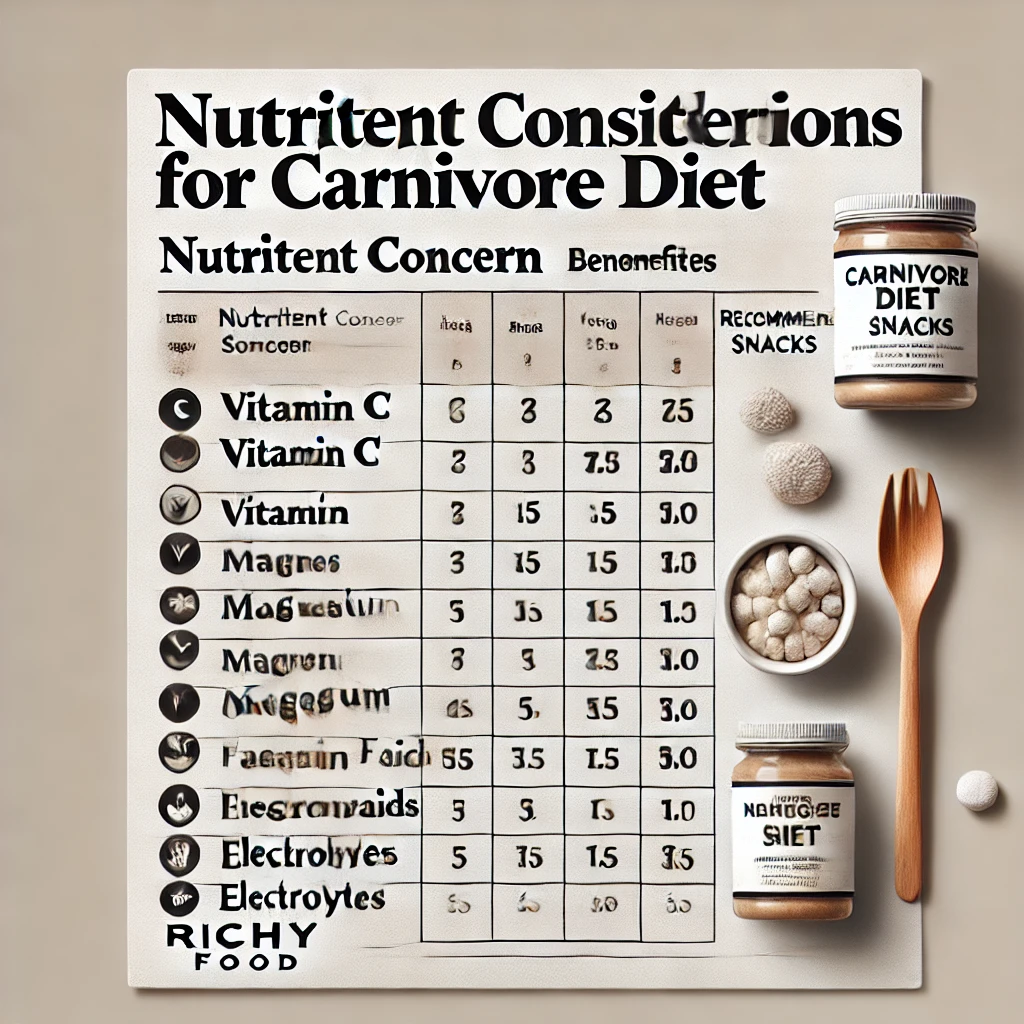
The carnivore diet provides a variety of essential nutrients through animal-based foods, but careful planning can help ensure balanced nutrition, especially when it comes to snacking. While the diet is naturally rich in protein, fat, and certain minerals, some micronutrients may be harder to come by. Here’s what to keep in mind for a well-rounded, nutrient-rich snacking approach on the carnivore diet.
1. Micronutrient Gaps to Be Aware Of
- Vitamin C: Since this diet excludes fruits and vegetables, vitamin C intake can be a concern. However, some carnivore followers incorporate nutrient-dense options like beef liver, which has trace amounts of vitamin C. Bone marrow and certain organ meats also contain small amounts of this nutrient.
- Magnesium: While magnesium is more readily found in plant foods, certain animal products like bone broth, fish, and red meat contain trace amounts. Some followers may still need to consider a supplement if they experience muscle cramps or fatigue.
- Electrolytes: Sodium, potassium, and magnesium levels can drop during the initial transition to a carnivore diet. Incorporating mineral-rich snacks, such as fatty meats or bone broth, can help balance electrolytes.
2. Nutrient-Dense Snack Options
- Liver Jerky: Liver is an excellent source of vitamins A, B12, iron, and folate. Liver jerky provides a nutrient-packed, portable snack, perfect for filling common vitamin and mineral gaps.
- Bone Broth: Bone broth contains collagen, amino acids, and minerals like calcium and magnesium. It’s a great snack for promoting joint, skin, and gut health.
- Egg Yolks: Yolks are rich in vitamins A, D, and E, as well as choline, an essential nutrient for brain health. Hard-boiled eggs or egg yolk-based snacks offer convenience with substantial nutrition.
- Sardines or Salmon: These fish are rich in omega-3 fatty acids and provide a good source of calcium when eaten with bones. They’re ideal for carnivore-friendly snacks that boost heart and brain health.
3. Tips for Balancing Nutrition on the Carnivore Diet
- Include Organ Meats Regularly: Organ meats like liver and kidney provide essential vitamins and minerals not as abundant in muscle meats alone. Adding these to your snack routine can support a balanced nutrient profile.
- Use Bone Broth as a Snack or Beverage: Sipping bone broth throughout the day offers hydration and essential minerals, helping to prevent deficiencies and improve gut health.
- Consider Supplementation if Needed: Although the carnivore diet focuses on whole foods, some people may benefit from targeted supplements, especially during the initial phases of transitioning to this diet.
Quick Recap: Nutrient Considerations for Carnivore Snacks
| Nutrient Concern | Recommended Snacks | Benefits |
|---|---|---|
| Vitamin C | Liver jerky | Supports immune function, skin health |
| Magnesium | Bone broth, red meat, fish | Prevents muscle cramps, supports energy |
| Omega-3 Fatty Acids | Sardines, salmon | Promotes heart and brain health |
| Electrolytes | Bone broth, fatty meats | Balances hydration and prevents fatigue |
Selecting nutrient-dense snacks is key to maintaining energy, health, and balance on the carnivore diet. These options not only support dietary goals but also help mitigate potential deficiencies.
7.Preparing Carnivore Snacks at Home vs. Buying Them
When it comes to carnivore diet snacks, there are two main options: preparing them at home or purchasing ready-made options. Each approach has its own advantages and considerations, depending on your time, budget, and dietary needs. Let’s explore the benefits and challenges of each option to help you decide what’s best for your lifestyle.
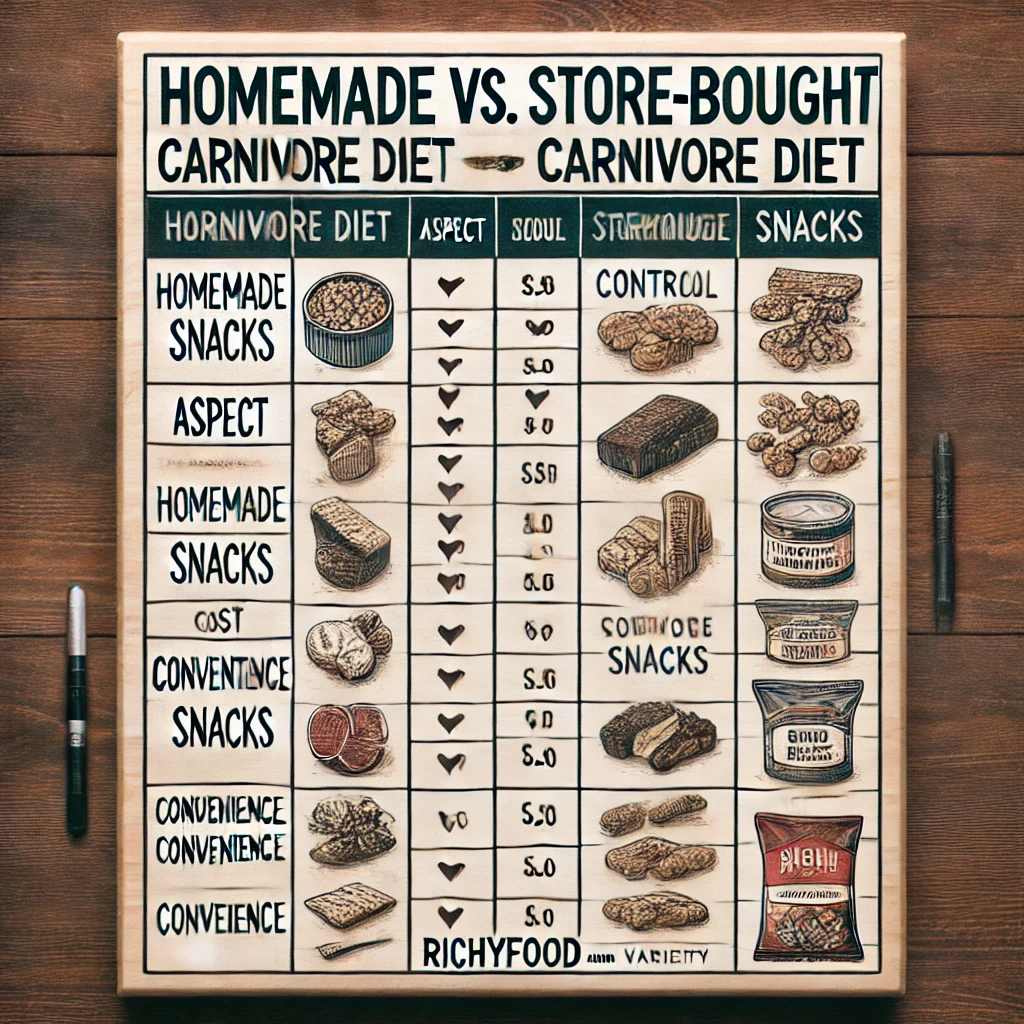
1. Homemade Carnivore Diet Snacks
Making carnivore snacks at home gives you full control over ingredients, preparation methods, and freshness. Here’s a closer look at why some carnivore dieters prefer homemade snacks:
- Control Over Ingredients: Homemade snacks ensure that you’re using high-quality ingredients without any hidden additives, preservatives, or sugars. This is especially important on a strict carnivore diet, where any unwanted ingredients can impact your dietary goals.
- Cost-Effective: Preparing snacks at home, such as beef jerky, bone broth, or bacon, can be more affordable in the long run compared to purchasing pre-packaged options.
- Customization: Making snacks yourself allows you to tailor flavors, textures, and nutrient content according to your preferences. For example, you can create jerky from different cuts of meat or add minimal seasonings that fit within the carnivore guidelines.“Preparing your own carnivore snacks gives you total control over what goes into your body, ensuring a clean and compliant option without the guesswork.”
Popular Homemade Carnivore Snacks
- Beef Jerky: Simple to make with thinly sliced meat and salt, dehydrated for convenient snacking.
- Bacon: Cooking bacon at home ensures it’s free from preservatives and added sugars.
- Bone Broth: Made from simmering bones over low heat, it provides collagen and minerals beneficial for joint and gut health.
- Egg Muffins: Whisk eggs with a choice of meat, pour into muffin tins, and bake for a portable, protein-packed snack.
2. Store-Bought Carnivore Diet Snacks
While homemade snacks offer control, store-bought options are convenient and ideal for those with busy schedules. With a variety of carnivore-friendly products available, it’s easy to find ready-made snacks that align with diet requirements.
- Convenience: Buying snacks saves time and effort, making it easier to stick to the carnivore diet when you’re short on time or on the go.
- Portability: Many store-bought carnivore snacks, like jerky, canned fish, and pork rinds, are shelf-stable and portable, making them ideal for travel or work.
- Variety: Some pre-packaged options come in flavors and textures that are difficult to replicate at home, giving you a wider range of choices.
Recommended Store-Bought Carnivore Snacks
- Meat Sticks and Jerky: Look for options with minimal ingredients, ideally just meat and salt.
- Pork Rinds: Available in various flavors, pork rinds are crunchy, high in fat, and low in carbs.
- Canned Fish: Sardines, tuna, and salmon packed in water or oil are excellent sources of protein and omega-3 fatty acids.
- Cheese Sticks: Portable, high in fat, and protein-rich, making them a quick grab-and-go option.
Quick Comparison: Homemade vs. Store-Bought Carnivore Snacks
| Aspect | Homemade Snacks | Store-Bought Snacks |
|---|---|---|
| Control Over Ingredients | Full control, customizable | Limited control, check labels carefully |
| Cost | More affordable over time | May be more expensive per serving |
| Convenience | Requires time and effort to prepare | Ready-made, ideal for busy schedules |
| Variety | Limited by available ingredients | Wide range of flavors and textures |
Both homemade and store-bought snacks have their own set of advantages. For those looking for quality control and cost-effectiveness, homemade options are ideal. For those needing convenience and variety, store-bought snacks provide a simple solution to stay on track with the carnivore diet.
8.Tips for Finding Carnivore Diet Snacks While Traveling
Traveling on the carnivore diet may seem challenging, but with some preparation and a few handy tips, it’s entirely possible to stay on track. Whether you’re taking a road trip, flying, or just have a busy day away from home, these strategies will help ensure you have access to carnivore-friendly snacks that meet your dietary needs.
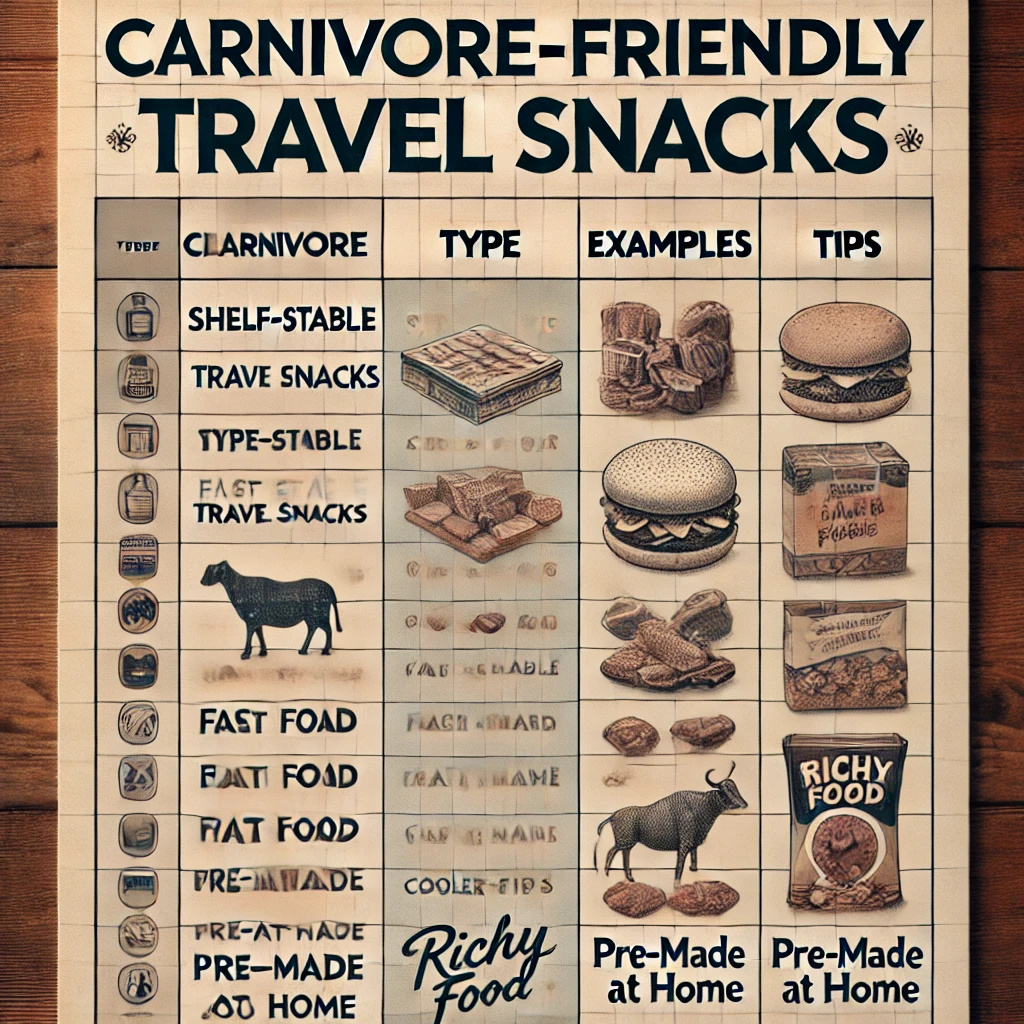
1. Pack Shelf-Stable Options
- Beef Jerky and Meat Sticks: These are easy to pack and don’t require refrigeration. Look for options with minimal ingredients (ideally just meat and salt) to avoid hidden sugars and additives.
- Pork Rinds: High in fat and crunch, pork rinds are a convenient travel snack that’s both satisfying and shelf-stable.
- Canned Fish: Tuna, sardines, and salmon packed in water or oil make excellent sources of protein and healthy fats. They’re small, portable, and can be eaten directly from the can.
- Cheese Crisps and Hard Cheese: Hard cheeses and cheese crisps are less perishable and can stay fresh for longer periods, making them great for travel.
2. Opt for Carnivore-Friendly Fast Food Options
If you’re in a pinch, many fast-food restaurants offer options that can be modified to fit the carnivore diet. Here are a few ideas:
- Order Burger Patties Only: Many fast-food places will serve plain burger patties without buns or toppings. Simply ask for the patties only, which can be high in protein and fat.
- Bacon or Egg Sides: Some chains offer breakfast items all day. Order sides of bacon or eggs for a simple carnivore snack.
- Grilled Chicken or Steak: Some restaurants offer grilled chicken or steak options that can be ordered plain, making them easy to fit into the carnivore diet.
3. Prepare Snacks in Advance for Long Trips
For extended travel, preparing snacks at home before you leave ensures you have exactly what you need. Here are some ideas:
- Cooked Bacon: Bacon is flavorful and can be easily packed in a container for a savory snack.
- Boiled Eggs: Hard-boiled eggs are a convenient, protein-packed snack that travels well and can be stored in a cooler for extended freshness.
- Homemade Jerky: Make your own beef or lamb jerky to control ingredients and enjoy a shelf-stable snack that’s easy to pack.
4. Keep a Cooler for Road Trips
If you’re driving, bringing a small cooler can expand your snack options considerably. With a cooler, you can pack perishable items like:
- Cheese Sticks: High in fat and protein, cheese sticks are satisfying and easy to eat on the road.
- Pre-Cooked Meats: Pack cooked meats like grilled chicken, steak strips, or sausages for a hearty carnivore snack.
- Bone Broth: Keep a thermos with warm bone broth for sipping as a snack. It’s nutritious, filling, and packed with collagen and minerals.
Quick Recap: Carnivore-Friendly Travel Snacks
| Type | Examples | Tips |
|---|---|---|
| Shelf-Stable | Beef jerky, pork rinds, canned fish | Look for minimal ingredients |
| Fast Food | Plain burger patties, bacon, grilled chicken | Ask for plain, no bun or toppings |
| Pre-Made at Home | Boiled eggs, cooked bacon, homemade jerky | Pack in containers for easy access |
| Cooler-Friendly | Cheese sticks, pre-cooked meats, bone broth | Use a small cooler to keep items fresh |
With the right preparation, sticking to the carnivore diet while traveling can be simple and stress-free. These snack ideas ensure you have plenty of options for staying full and satisfied, even when on the go.
9.Common Questions About Carnivore Diet Snacks
The carnivore diet often raises questions, especially regarding snacks that align with its strict, animal-based guidelines. Here are answers to some of the most frequently asked questions about carnivore diet snacks.
1. What Snacks Can You Eat on a Carnivore Diet?
- Answer: Carnivore diet snacks include any animal-based products that are low in carbs and free of plant ingredients. Popular choices are beef jerky, pork rinds, hard-boiled eggs, bacon, and cheese crisps. Shelf-stable options like canned fish or meat sticks are also convenient for snacking on the go.
2. Are Dairy-Based Snacks Allowed on the Carnivore Diet?
- Answer: Dairy is generally accepted on the carnivore diet if tolerated. Hard cheeses, cheese sticks, and cheese crisps are common snack options. However, individuals with lactose intolerance or dairy sensitivity may want to limit or avoid dairy products.
3. Can I Have Nuts on a Carnivore Diet as a Snack?
- Answer: No, nuts are plant-based and not permitted on the strict carnivore diet. Instead, carnivore-friendly snacks focus on animal-based items, which provide essential proteins and fats without the carbs found in nuts.
4. Is Protein Powder a Good Snack Option on a Carnivore Diet?
- Answer: Protein powders are usually derived from animal or plant sources. Some carnivore dieters use collagen powder or bone broth protein powder for additional nutrients, but whole-food snacks like jerky or boiled eggs are preferred for maximum nutrient density and satiety.
5. What’s a Good Snack Before or After a Workout on the Carnivore Diet?
- Answer: High-protein and moderate-fat snacks are ideal for workout support. Options like beef jerky, hard-boiled eggs, or bone broth offer protein for muscle recovery without introducing carbs.
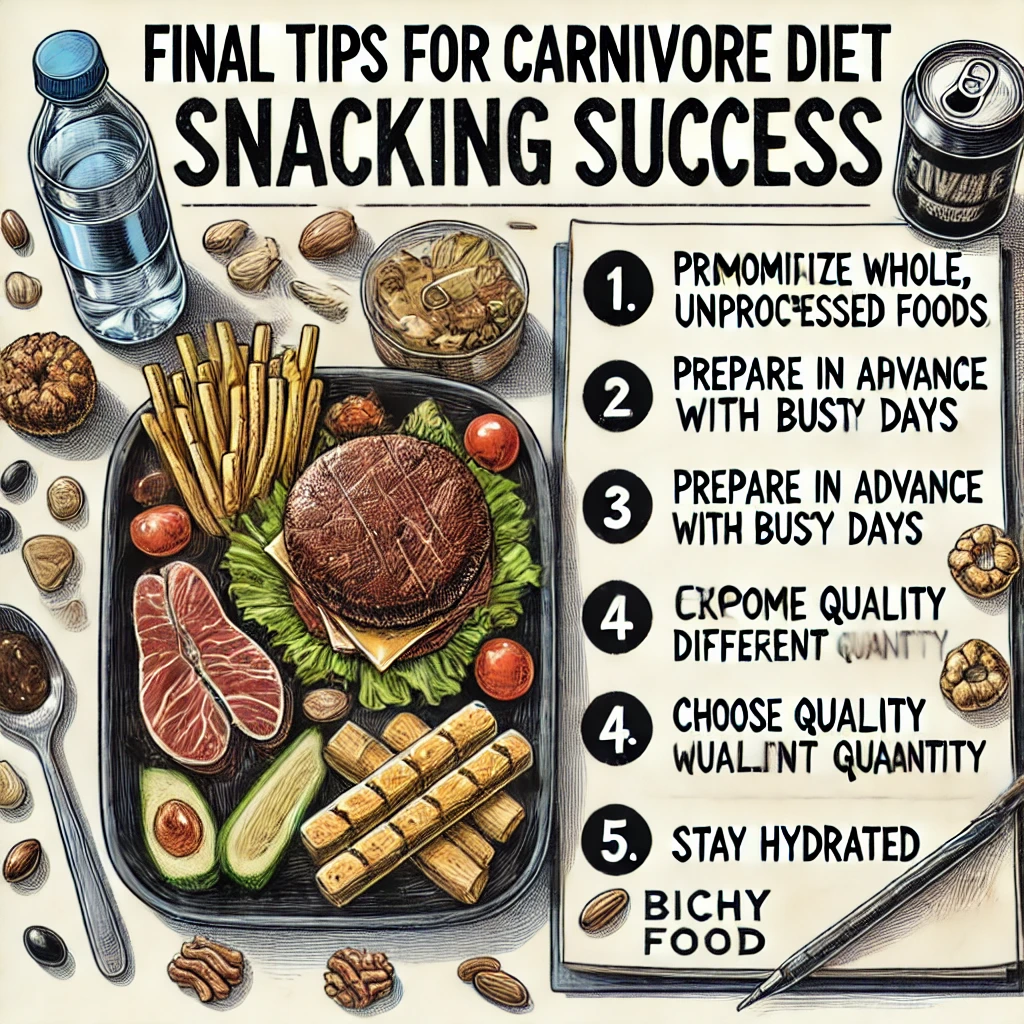
For access to scientific studies on nutrition, health benefits, and potential effects of a meat-based diet. visit PubMed

